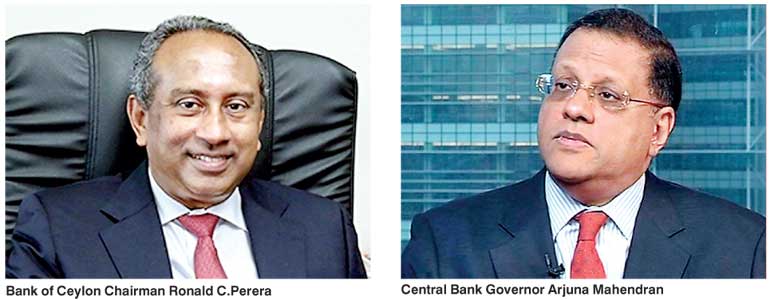Wednesday Feb 18, 2026
Wednesday Feb 18, 2026
Tuesday, 26 May 2015 00:01 - - {{hitsCtrl.values.hits}}
The Parliamentary brawl over the Bond scam was a revealing event. It exposed the fragile nature of the Maithripala presidency and the UNP administration.
The coercive deep State has been replaced by a duplicitous corporate State. The rich continue to steal from the poor. The educated morons, having established a precarious perch in power, are busy promising that with enough hard work, they can pay off their debt. The ‘Gamarala’ from Thamankaduwa is under siege by the Royal College ‘chumocracy’.
The UNP establishment with too many people with the same interests and same out-of-touch assessment of their electoral prospects is on the brink of derailing the movement for good governance.
The puerile attempt by the Prime Minister to take refuge behind past sins of Nivard Cabraal is as obscene as the utterance of the pseudo-Marxist comrade deleted from Hansard and heard with a ping on electronic media.
The title of the Report of the three lawyers is explicit. Their remit is to “Look into the Bond issues of the Central Bank 2015”. They have looked and recorded what they found. Interestingly the report takes note of an observation made by then Justice Sri Pavan on the Greek Bond case which was dismissed by the Supreme Court.
Sri Pavan J as quoted by the committee says: “We must not forget that in complex economic policy matters, decision is necessarily empiric and therefore its validity cannot be tested on any rigid formula or strict consideration…”
The committee seems to have treated the obiter dicta as a binding authority. It is consistent with the efforts by the Government to elevate Bond trading in to a higher realm beyond the reach of the average citizen.
Empiricism asserts that experience alone is the basis of knowledge. It relies on observation of facts. Chancellor Angela Merkel observed the facts but got out of the Greek business out of hardnosed assessment of probabilities. It seems that in our dispensation, Nivard Cabral has an edge over Merkel.

Crony capitalism and regulatory capture
The UNP seems to be bent on perpetuating crony capitalism and regulatory capture under the seal and approval of the Maithripala mandate for democratic reform.
Before 8 January, it was brazen theft. The new plutocrats are redesigning a system that legalises theft. Cronies have taken over from the brothers.
The Committee has determined that there is no evidence pointing to the effect that the Governor of the Central Bank had direct participation in the decision-making process of the Tender Board Committee.
Yet, they have found the biding pattern of Perpetual Treasuries – the primary dealer linked to the Governor’s son-in-law, to be unusual. They have also found that it was unusual for a primary dealer to forward bids through another primary dealer – the Bank of Ceylon, which is the premier State-owned bank. But the committee has not asked the Central Bank Tender Committee why they failed to take note of the unusual biding pattern and the unusual practice of one primary dealer biding for and on behalf of another primary dealer!
The committee seems anxious to clear the Chairman and the Board of Directors of the Bank of Ceylon of any wrongdoing. It unequivocally asserts that ‘the chief dealer of the Bank of Ceylon had failed and neglected to apprise the Board of the BOC thereafter.’
In defence of Arjun Mahendran
In an article published in the Daily FT of 20 March captioned ‘In defence of Arjun Mahendran’, this writer went on record that “The allegation is that the primary dealer connected to the son-in-law of the Governor has put in a bid for Rs. 5 billion directly and through the Bank of Ceylon. The Bank of Ceylon is now headed by Ronald Perera P.C. and high-profile member of the UNP Working Committee. Obviously the impugned insider information would have been available to the Bank of Ceylon as well.”
The committee reports that it had interviewed the Governor. It quotes the Governor as stating that he made it clear that the restart of auctions was important. The new Governor had pointed out that the previous Governor had borrowed from EPF and invested in  commercial banks and instructed commercial banks to borrow from overseas. In this context he stated that BOC had raised $ 1 billion. NSB had raised $ 1 billion and DFCC had raised $ 200 million. This information, though startling, is not surprising. It was well known.
commercial banks and instructed commercial banks to borrow from overseas. In this context he stated that BOC had raised $ 1 billion. NSB had raised $ 1 billion and DFCC had raised $ 200 million. This information, though startling, is not surprising. It was well known.
Dinesh Weerakkody, who is a close advisor of Prime Minister Ranil Wickremesinghe, functioned quite effectively and eminently as Chairman of Commercial Bank under the previous regime. He could not have reached those heights in the absence of at least the passive patronage of the then regime. He is the son-in-law of John Amaratunga. He owed his election to the close links of his father-in-law to the then Defence Secretary Gotabaya Rajapaksa, whose nominee on the Board of the Commercial Bank was his controversial aide, Lakshman Hulugalle.
The UNP in Opposition had a ringside seat in the banking arena. Except for the exuberance of a few young Turks, the old guard of the UNP was a tame appendage of the Rajapaksa monolith.
With a financial system dominated by State-owned banks and State-influenced banks, the boundaries between the political elite and bureaucrats remain blurred. This seems to have escaped the attention of the three lawyers peering in to the vortex of spiralling corruption in banks.
Committee observations
The Committee observes that the Bank of Ceylon being a Primary Dealer had placed bids amounting to Rs. 13 billion for and on behalf of Perpetual Treasuries. The Chief Dealer of BOC and the CEO of Perpetual Treasuries have both confirmed that this was the first time that a primary dealer had forwarded bids at an auction for and behalf of another primary dealer.
The Committee that has been tasked to look in to the Bond issue has not bothered to ask the Central Bank Tender Committee as to how this unusual biding pattern was ignored by them.
The Committee has been equally sanguine in its acceptance of the claim by the Chief Dealer of the BOC that the facilitation of the bid was not a credit facility. It records that the Chief Dealer had failed to apprise the BOC board. If it was not a credit facility, what should be the definition of an undertaking that committed the Bank to the tune of Rs. 13 billion?
When the Committee specifically asked the Perpetual Treasuries CEO of his unusual bidding pattern, his explanation had been that they were well aware that the Government would be raising unusually high funds for payments of several projects.
The three lawyers could have accessed precedents in cyber space. In the US, John Youngdahl, a former Goldman Sachs Group economist who tipped off the firm’s traders about the demise of the 30-year Treasury bond, pleaded guilty to criminal insider-trading charges in the US.
The committee says that when asked if they possessed any inside information, the response had been that the information was available in the public domain. Hence it was not insider information.
The CEO of Perpetual Treasuries knows his business. He flits and floats in that magic circle of the wealth management industry. He knows that the State-owned Bank of Ceylon and the Central Bank under the Prime Minister’s purview would serve the people and vested interests even-handedly.
The three lawyers have looked with great diligence. They have reported on what was shown to them. In addition to their unsubstantiated assertion that the Governor has had no direct involvement, they have returned an open verdict.
Role of the Bank of Ceylon
What is evident is the unusual and therefore the dubious role of the Bank of Ceylon. The State-owned banks have privileged access to Governmental officials and are subject to strong political influence. Besides all that, the Bank of Ceylon enjoys a near monopolistic position in the Bond market.
It is in the forefront in financing loss-making State-Owned Enterprises. It has a reputation for providing financing on non-commercial terms to certain sectors of the economy. It has a track record of offering direct credit based on political connections rather than risk assessment. Directed lending is part of its special status as the premier State-owned bank.
Our democracy, held hostage by an autocrat, is now captured by a ruling class committed to perpetuate its privileges muted for 10 years by barbarians from the Deep South.
The Bond scam is the result of the ‘chumocracy’ that has been at the heart of the UNP establishment. It consists of many people with the same interests and the same out-of-touch sense of entitlement coming together to protect their own.